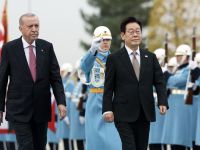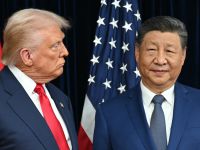French President Jacques Chirac arrived Monday in the United Arab Emirates (UAE) on the second leg of a Middle East tour for talks on the region's stalled peace process and the war in Afghanistan.
The official Emirati news agency (WAM) said the French leader was greeted in Abu Dhabi by the UAE's vice president and Dubai's ruler, Sheikh Maktoum bin Rashid Al Maktoum.
Chirac, who flew in from the Egyptian capital, is to meet Sheikh Zayed bin Sultan Al Nahyan, the president, on Tuesday before traveling on to Saudi Arabia.
France has signed multi-billion-dollar military contracts with Abu Dhabi since the end of the 1991 Gulf War.
Chirac's talks in Abu Dhabi are expected to focus on "the war on terrorism and the prospects for re-launching the peace process in the Middle East," an Emirati official, asking not to be named, told AFP.
Chirac is expected to find Saudi Arabia and the UAE torn between their traditional defense of Islam and fellow Muslims and the need to join the US campaign launched after the Sept. 11 attacks on New York and Washington.
In the aftermath of the terror attacks, Chirac's message about the need to work out a political solution for Afghanistan and step up humanitarian aid will be welcomed by Saudi and Emirati leaders, according to Gulf officials.
In Cairo, the French president said military action in the US-led campaign against terrorism must be limited to Afghanistan and called for an international conference to revive Israeli-Palestinian peace talks.
According to the CNN, Chirac also supported calls for the United Nations to be involved in Afghanistan's political future.
Speaking after talks with Egyptian President Hosni Mubarak, Chirac said the two leaders agreed on "the need for putting a political solution into practice" under UN auspices.
"The United Nations should take charge of this job because it is the only party capable of it and of giving help quickly to the refugees," the French leader said at a news conference.
Chirac also said the US-led military campaign should be restricted to Afghanistan.
Arab leaders have said US strikes on Arab states such as Iraq would add to anti-US sentiment in Arab countries, already high because of a perceived US anti-Muslim bias, particularly over Israel, according to the news service.
Mubarak told the news conference that US President George W. Bush - who decided against a first-ever meeting with Palestinian President Yasser Arafat in New York at the weekend - would eventually have to talk directly with Arafat.
"After Arafat it will be difficult to negotiate with (Palestinians) because Israel won't find anyone the Palestinians have a consensus about," he added.
Chirac also gave an interview to an Arab newspaper stressing that an international solution was needed to the Afghan government dilemma.
"I wanted to go to Riyadh... to consult with King Fahd and Crown Prince Abdullah on the political future of Afghanistan and the crisis in the Middle East," he said in an interview published in the Arabic-language Al Hayat on Monday, as cited by CNN.
"I think that the military operation must be accompanied by international mobilization for a political solution.
"This means facilitating a consensus between all the Afghan elements so they can form a transitional government," he said in the interview, conducted in Paris just before the trip.
Chirac also told Al Hayat that he and Mubarak shared similar views on Afghanistan, combating terrorism and Middle East peace.
But he denied there was a "causal link between the dispute in the Middle East and international terrorism." -Albawaba.com
© 2001 Al Bawaba (www.albawaba.com)







